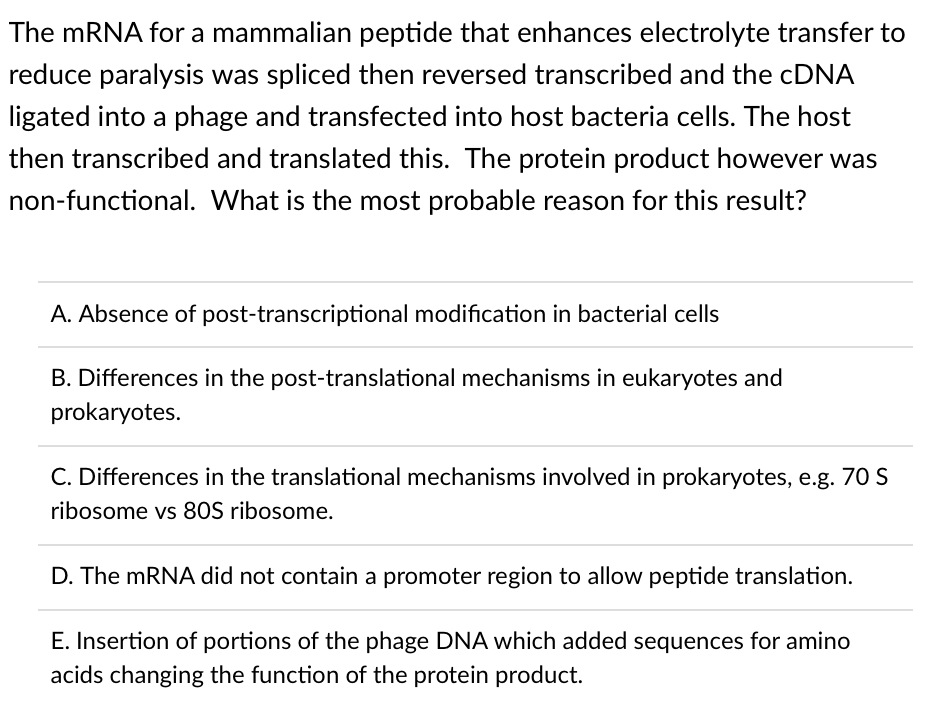The MRNA for a mammalian peptide that enhances electrolyte transfer to reduce paralysis was spliced then reversed transcribed and the CDNA ligated into a phage and transfected into host bacteria cells. The host then transcribed and translated this. The protein product however was non-functional. What is the most probable reason for this result? A. Absence of post-transcriptional modification in bacterial cells B. Differences in the post-translational mechanisms in eukaryotes and prokaryotes. C. Differences in the translational mechanisms involved in prokaryotes, e.g. 70 S ribosome vs 80S ribosome. D. The MRNA did not contain a promoter region to allow peptide translation. E. Insertion of portions of the phage DNA which added sequences for amino acids changing the function of the protein product.
The MRNA for a mammalian peptide that enhances electrolyte transfer to reduce paralysis was spliced then reversed transcribed and the CDNA ligated into a phage and transfected into host bacteria cells. The host then transcribed and translated this. The protein product however was non-functional. What is the most probable reason for this result? A. Absence of post-transcriptional modification in bacterial cells B. Differences in the post-translational mechanisms in eukaryotes and prokaryotes. C. Differences in the translational mechanisms involved in prokaryotes, e.g. 70 S ribosome vs 80S ribosome. D. The MRNA did not contain a promoter region to allow peptide translation. E. Insertion of portions of the phage DNA which added sequences for amino acids changing the function of the protein product.
Biology (MindTap Course List)
11th Edition
ISBN:9781337392938
Author:Eldra Solomon, Charles Martin, Diana W. Martin, Linda R. Berg
Publisher:Eldra Solomon, Charles Martin, Diana W. Martin, Linda R. Berg
Chapter14: Gene Regulation
Section: Chapter Questions
Problem 8TYU: Through alternative splicing, eukaryotes (a) reinforce gene inactivation (b) prevent transcription...
Related questions
Question

Transcribed Image Text:The MRNA for a mammalian peptide that enhances electrolyte transfer to
reduce paralysis was spliced then reversed transcribed and the CDNA
ligated into a phage and transfected into host bacteria cells. The host
then transcribed and translated this. The protein product however was
non-functional. What is the most probable reason for this result?
A. Absence of post-transcriptional modification in bacterial cells
B. Differences in the post-translational mechanisms in eukaryotes and
prokaryotes.
C. Differences in the translational mechanisms involved in prokaryotes, e.g. 70 S
ribosome vs 80S ribosome.
D. The mRNA did not contain a promoter region to allow peptide translation.
E. Insertion of portions of the phage DNA which added sequences for amino
acids changing the function of the protein product.
Expert Solution
This question has been solved!
Explore an expertly crafted, step-by-step solution for a thorough understanding of key concepts.
Step by step
Solved in 3 steps

Recommended textbooks for you

Biology (MindTap Course List)
Biology
ISBN:
9781337392938
Author:
Eldra Solomon, Charles Martin, Diana W. Martin, Linda R. Berg
Publisher:
Cengage Learning

Biology (MindTap Course List)
Biology
ISBN:
9781337392938
Author:
Eldra Solomon, Charles Martin, Diana W. Martin, Linda R. Berg
Publisher:
Cengage Learning